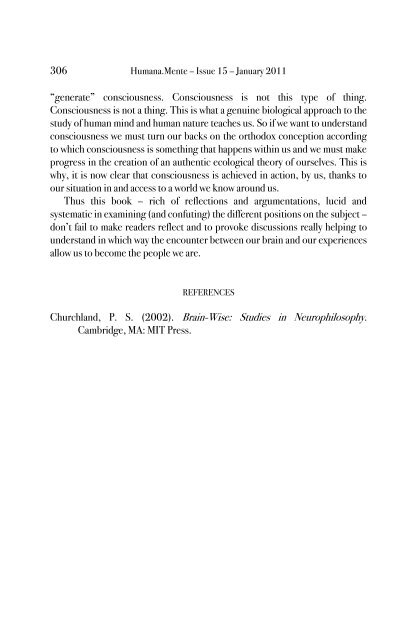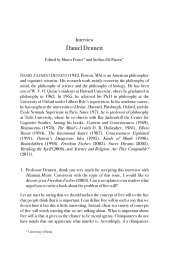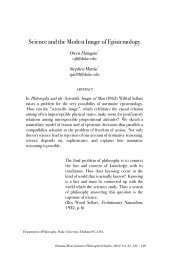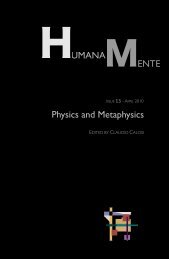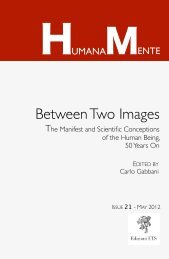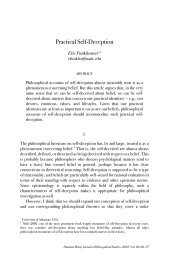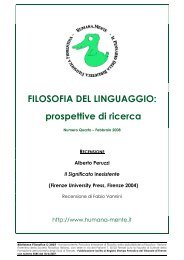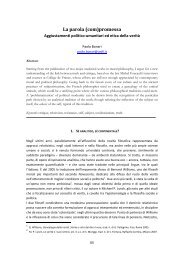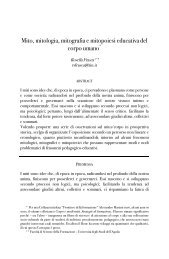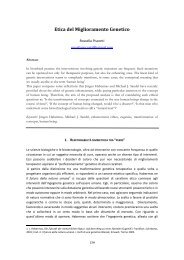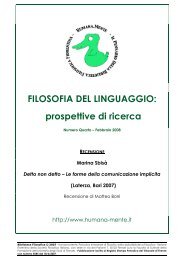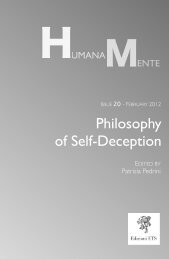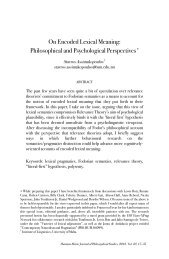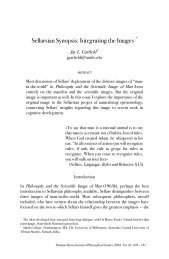- Page 1 and 2:
UMANA ENTE ISSUE 15 - JANUARY 2011
- Page 3 and 4:
TABLE OF CONTENTS FOREWORD Duccio M
- Page 5:
Daniel M. Wegner - The Illusion of
- Page 8 and 9:
VI Humana.Mente - Issue 15 - Januar
- Page 10 and 11:
VIII Humana.Mente - Issue 15 - Janu
- Page 12 and 13:
X Humana.Mente - Issue 15 - January
- Page 14 and 15:
XII Humana.Mente - Issue 15 - Janua
- Page 16 and 17:
XIV Humana.Mente - Issue 15 - Janua
- Page 18 and 19:
2 Humana.Mente - Issue 15 - January
- Page 20 and 21:
4 Humana.Mente - Issue 15 - January
- Page 22 and 23:
6 Humana.Mente - Issue 15 - January
- Page 24 and 25:
8 Humana.Mente - Issue 15 - January
- Page 26 and 27:
10 Humana.Mente - Issue 15 - Januar
- Page 28 and 29:
12 Humana.Mente - Issue 15 - Januar
- Page 30 and 31:
14 Humana.Mente - Issue 15 - Januar
- Page 32 and 33:
16 Humana.Mente - Issue 15 - Januar
- Page 34 and 35:
18 Humana.Mente - Issue 15 - Januar
- Page 36 and 37:
20 Humana.Mente - Issue 15 - Januar
- Page 38 and 39:
22 Humana.Mente - Issue 15 - Januar
- Page 40 and 41:
24 Humana.Mente - Issue 15 - Januar
- Page 42 and 43:
26 Humana.Mente - Issue 15 - Januar
- Page 44 and 45:
28 Humana.Mente - Issue 15 - Januar
- Page 46 and 47:
30 Humana.Mente - Issue 15 - Januar
- Page 48 and 49:
32 Humana.Mente - Issue 15 - Januar
- Page 50 and 51:
34 Humana.Mente - Issue 15 - Januar
- Page 52 and 53:
36 Humana.Mente - Issue 15 - Januar
- Page 54 and 55:
38 Humana.Mente - Issue 15 - Januar
- Page 56 and 57:
40 Humana.Mente - Issue 15 - Januar
- Page 58 and 59:
42 Humana.Mente - Issue 15 - Januar
- Page 60 and 61:
44 Humana.Mente - Issue 15 - Januar
- Page 62 and 63:
46 Humana.Mente - Issue 15 - Januar
- Page 64 and 65:
48 Humana.Mente - Issue 15 - Januar
- Page 66 and 67:
50 Humana.Mente - Issue 15 - Januar
- Page 68 and 69:
52 Humana.Mente - Issue 15 - Januar
- Page 70 and 71:
54 Humana.Mente - Issue 15 - Januar
- Page 72 and 73:
56 Humana.Mente - Issue 15 - Januar
- Page 74 and 75:
58 Humana.Mente - Issue 15 - Januar
- Page 76 and 77:
60 Humana.Mente - Issue 15 - Januar
- Page 78 and 79:
62 Humana.Mente - Issue 15 - Januar
- Page 80 and 81:
64 Humana.Mente - Issue 15 - Januar
- Page 82 and 83:
66 Humana.Mente - Issue 15 - Januar
- Page 84 and 85:
68 Humana.Mente - Issue 15 - Januar
- Page 86 and 87:
70 Humana.Mente - Issue 15 - Januar
- Page 88 and 89:
72 Humana.Mente - Issue 15 - Januar
- Page 90 and 91:
74 Humana.Mente - Issue 15 - Januar
- Page 92 and 93:
76 Humana.Mente - Issue 15 - Januar
- Page 94 and 95:
78 Humana.Mente - Issue 15 - Januar
- Page 96 and 97:
80 Humana.Mente - Issue 15 - Januar
- Page 98 and 99:
82 Humana.Mente - Issue 15 - Januar
- Page 100 and 101:
84 Humana.Mente - Issue 15 - Januar
- Page 102 and 103:
86 Humana.Mente - Issue 15 - Januar
- Page 104 and 105:
88 Humana.Mente - Issue 15 - Januar
- Page 106 and 107:
90 Humana.Mente - Issue 15 - Januar
- Page 108 and 109:
92 Humana.Mente - Issue 15 - Januar
- Page 110 and 111:
94 Humana.Mente - Issue 15 - Januar
- Page 112 and 113:
96 Humana.Mente - Issue 15 - Januar
- Page 114 and 115:
98 Humana.Mente - Issue 15 - Januar
- Page 116 and 117:
100 Humana.Mente - Issue 15 - Janua
- Page 118 and 119:
102 Humana.Mente - Issue 15 - Janua
- Page 120 and 121:
104 Humana.Mente - Issue 15 - Janua
- Page 122 and 123:
106 Humana.Mente - Issue 15 - Janua
- Page 124 and 125:
108 Humana.Mente - Issue 15 - Janua
- Page 126 and 127:
110 Humana.Mente - Issue 15 - Janua
- Page 128 and 129:
112 Humana.Mente - Issue 15 - Janua
- Page 130 and 131:
114 Humana.Mente - Issue 15 - Janua
- Page 132 and 133:
116 Humana.Mente - Issue 15 - Janua
- Page 134 and 135:
118 Humana.Mente - Issue 15 - Janua
- Page 136 and 137:
120 Humana.Mente - Issue 15 - Janua
- Page 138 and 139:
122 Humana.Mente - Issue 15 - Janua
- Page 140 and 141:
124 Humana.Mente - Issue 15 - Janua
- Page 142 and 143:
126 Humana.Mente - Issue 15 - Janua
- Page 144 and 145:
128 Humana.Mente - Issue 15 - Janua
- Page 146 and 147:
130 Humana.Mente - Issue 15 - Janua
- Page 148 and 149:
132 Humana.Mente - Issue 15 - Janua
- Page 150 and 151:
134 Humana.Mente - Issue 15 - Janua
- Page 152 and 153:
136 Humana.Mente - Issue 15 - Janua
- Page 154 and 155:
138 Humana.Mente - Issue 15 - Janua
- Page 156 and 157:
140 Humana.Mente - Issue 15 - Janua
- Page 158 and 159:
142 Humana.Mente - Issue 15 - Janua
- Page 160 and 161:
144 Humana.Mente - Issue 15 - Janua
- Page 162 and 163:
146 Humana.Mente - Issue 15 - Janua
- Page 164 and 165:
148 Humana.Mente - Issue 15 - Janua
- Page 166 and 167:
150 Humana.Mente - Issue 15 - Janua
- Page 168 and 169:
152 Humana.Mente - Issue 15 - Janua
- Page 170 and 171:
154 Humana.Mente - Issue 15 - Janua
- Page 172 and 173:
156 Humana.Mente - Issue 15 - Janua
- Page 174 and 175:
158 Humana.Mente - Issue 15 - Janua
- Page 176 and 177:
160 Humana.Mente - Issue 15 - Janua
- Page 178 and 179:
162 Humana.Mente - Issue 15 - Janua
- Page 180 and 181:
164 Humana.Mente - Issue 15 - Janua
- Page 182 and 183:
166 Humana.Mente - Issue 15 - Janua
- Page 184 and 185:
168 Humana.Mente - Issue 15 - Janua
- Page 186 and 187:
170 Humana.Mente - Issue 15 - Janua
- Page 188 and 189:
172 Humana.Mente - Issue 15 - Janua
- Page 190 and 191:
174 Humana.Mente - Issue 15 - Janua
- Page 192 and 193:
176 Humana.Mente - Issue 15 - Janua
- Page 194 and 195:
178 Humana.Mente - Issue 15 - Janua
- Page 196 and 197:
180 Humana.Mente - Issue 15 - Janua
- Page 198 and 199:
182 Humana.Mente - Issue 15 - Janua
- Page 200 and 201:
184 Humana.Mente - Issue 15 - Janua
- Page 202 and 203:
186 Humana.Mente - Issue 15 - Janua
- Page 204 and 205:
188 Humana.Mente - Issue 15 - Janua
- Page 206 and 207:
190 Humana.Mente - Issue 15 - Janua
- Page 208 and 209:
192 Humana.Mente - Issue 15 - Janua
- Page 210 and 211:
194 Humana.Mente - Issue 15 - Janua
- Page 212 and 213:
196 Humana.Mente - Issue 15 - Janua
- Page 214 and 215:
198 Humana.Mente - Issue 15 - Janua
- Page 216 and 217:
200 Humana.Mente - Issue 15 - Janua
- Page 218 and 219:
202 Humana.Mente - Issue 15 - Janua
- Page 220 and 221:
204 Humana.Mente - Issue 15 - Janua
- Page 222 and 223:
206 Humana.Mente - Issue 15 - Janua
- Page 224 and 225:
208 Humana.Mente - Issue 15 - Janua
- Page 226 and 227:
210 Humana.Mente - Issue 15 - Janua
- Page 228 and 229:
212 Humana.Mente - Issue 15 - Janua
- Page 230 and 231:
214 Humana.Mente - Issue 15 - Janua
- Page 232 and 233:
216 Humana.Mente - Issue 15 - Janua
- Page 234 and 235:
218 Humana.Mente - Issue 15 - Janua
- Page 236 and 237:
220 Humana.Mente - Issue 15 - Janua
- Page 238 and 239:
222 Humana.Mente - Issue 15 - Janua
- Page 240 and 241:
224 Humana.Mente - Issue 15 - Janua
- Page 242 and 243:
226 Humana.Mente - Issue 15 - Janua
- Page 244 and 245:
228 Humana.Mente - Issue 15 - Janua
- Page 246 and 247:
230 Humana.Mente - Issue 15 - Janua
- Page 248 and 249:
232 Humana.Mente - Issue 15 - Janua
- Page 250 and 251:
234 Humana.Mente - Issue 15 - Janua
- Page 252 and 253:
236 Humana.Mente - Issue 15 - Janua
- Page 254 and 255:
238 Humana.Mente - Issue 15 - Janua
- Page 256 and 257:
240 Humana.Mente - Issue 15 - Janua
- Page 258 and 259:
242 Humana.Mente - Issue 15 - Janua
- Page 260 and 261:
244 Humana.Mente - Issue 15 - Janua
- Page 262 and 263:
246 Humana.Mente - Issue 15 - Janua
- Page 264 and 265:
248 Humana.Mente - Issue 15 - Janua
- Page 266 and 267:
250 Humana.Mente - Issue 15 - Janua
- Page 268 and 269:
252 Humana.Mente - Issue 15 - Janua
- Page 270 and 271:
254 Humana.Mente - Issue 15 - Janua
- Page 272 and 273: 256 Humana.Mente - Issue 15 - Janua
- Page 274 and 275: 258 Humana.Mente - Issue 15 - Janua
- Page 276 and 277: 260 Humana.Mente - Issue 15 - Janua
- Page 278 and 279: 262 Humana.Mente - Issue 15 - Janua
- Page 280 and 281: 264 Humana.Mente - Issue 15 - Janua
- Page 282 and 283: 266 Humana.Mente - Issue 15 - Janua
- Page 284 and 285: 268 Humana.Mente - Issue 15 - Janua
- Page 286 and 287: 270 Humana.Mente - Issue 15 - Janua
- Page 288 and 289: 272 Humana.Mente - Issue 15 - Janua
- Page 290 and 291: 274 Humana.Mente - Issue 15 - Janua
- Page 292 and 293: 276 Humana.Mente - Issue 15 - Janua
- Page 294 and 295: 278 Humana.Mente - Issue 15 - Janua
- Page 296 and 297: 280 Humana.Mente - Issue 15 - Janua
- Page 298 and 299: 282 Humana.Mente - Issue 15 - Janua
- Page 300 and 301: 284 Humana.Mente - Issue 15 - Janua
- Page 302 and 303: 286 Humana.Mente - Issue 15 - Janua
- Page 304 and 305: 288 Humana.Mente - Issue 15 - Janua
- Page 306 and 307: 290 Humana.Mente - Issue 15 - Janua
- Page 308 and 309: 292 Humana.Mente - Issue 15 - Janua
- Page 310 and 311: 294 Humana.Mente - Issue 15 - Janua
- Page 312 and 313: 296 Humana.Mente - Issue 15 - Janua
- Page 314 and 315: 298 Humana.Mente - Issue 15 - Janua
- Page 316 and 317: 300 Humana.Mente - Issue 15 - Janua
- Page 318 and 319: 302 Humana.Mente - Issue 15 - Janua
- Page 320 and 321: 304 Humana.Mente - Issue 15 - Janua
- Page 324 and 325: 308 Humana.Mente - Issue 15 - Janua
- Page 326 and 327: 310 Humana.Mente - Issue 15 - Janua
- Page 328 and 329: 312 Humana.Mente - Issue 15 - Janua
- Page 330 and 331: 314 Humana.Mente - Issue 15 - Janua
- Page 332 and 333: 316 Humana.Mente - Issue 15 - Janua
- Page 334 and 335: 318 Humana.Mente - Issue 15 - Janua
- Page 336 and 337: 320 Humana.Mente - Issue 15 - Janua
- Page 338 and 339: 322 Humana.Mente - Issue 15 - Janua
- Page 340 and 341: 324 Humana.Mente - Issue 15 - Janua
- Page 342 and 343: 326 Humana.Mente - Issue 15 - Janua
- Page 344 and 345: 328 Humana.Mente - Issue 15 - Janua
- Page 346 and 347: 330 Humana.Mente - Issue 15 - Janua
- Page 348 and 349: 332 Humana.Mente - Issue 15 - Janua
- Page 350 and 351: 334 Humana.Mente - Issue 15 - Janua
- Page 352 and 353: 336 Humana.Mente - Issue 15 - Janua
- Page 354 and 355: 338 Humana.Mente - Issue 15 - Janua
- Page 356 and 357: 340 Humana.Mente - Issue 15 - Janua
- Page 358 and 359: 342 Humana.Mente - Issue 15 - Janua
- Page 360 and 361: 344 Humana.Mente - Issue 15 - Janua
- Page 362 and 363: 346 Humana.Mente - Issue 15 - Janua
- Page 364 and 365: 348 Humana.Mente - Issue 15 - Janua
- Page 366 and 367: 350 Humana.Mente - Issue 15 - Janua
- Page 368 and 369: 352 Humana.Mente - Issue 15 - Janua
- Page 370 and 371: 354 Humana.Mente - Issue 15 - Janua
- Page 372 and 373:
356 Humana.Mente - Issue 15 - Janua
- Page 374 and 375:
358 Humana.Mente - Issue 15 - Janua
- Page 376 and 377:
360 Humana.Mente - Issue 15 - Janua
- Page 378 and 379:
362 Humana.Mente - Issue 15 - Janua
- Page 380 and 381:
364 Humana.Mente - Issue 15 - Janua
- Page 382 and 383:
366 Humana.Mente - Issue 15 - Janua
- Page 384 and 385:
368 Humana.Mente - Issue 15 - Janua
- Page 386 and 387:
370 Humana.Mente - Issue 15 - Janua
- Page 388 and 389:
372 Humana.Mente - Issue 15 - Janua
- Page 390 and 391:
374 Humana.Mente - Issue 15 - Janua
- Page 392 and 393:
376 Humana.Mente - Issue 15 - Janua
- Page 394 and 395:
378 Humana.Mente - Issue 15 - Janua
- Page 396 and 397:
380 Humana.Mente - Issue 15 - Janua
- Page 398 and 399:
382 Humana.Mente - Issue 15 - Janua
- Page 400 and 401:
384 Humana.Mente - Issue 15 - Janua
- Page 402 and 403:
386 Humana.Mente - Issue 15 - Janua
- Page 404:
www.humanamente.eu Humana.Mente - J


